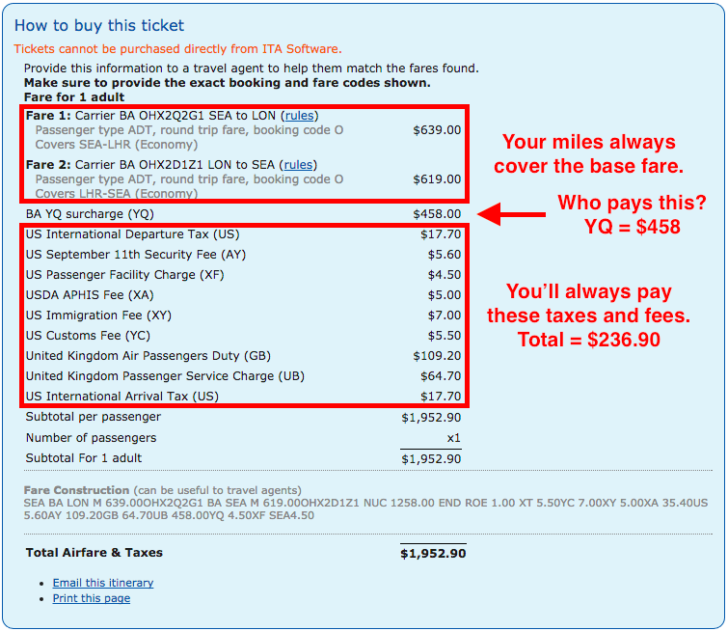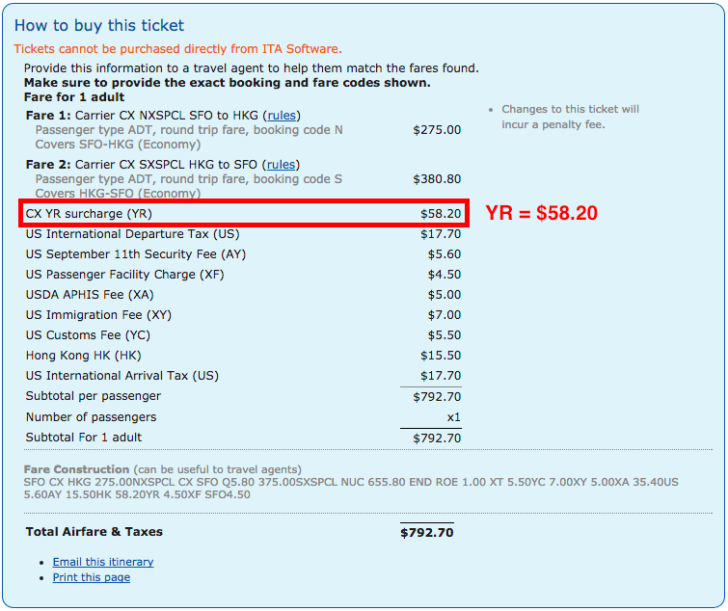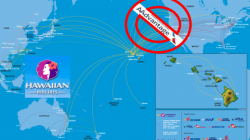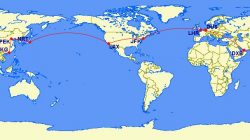Many readers are understandably concerned about the cost of fees and taxes when they book award travel. You worked so hard to earn those miles for a “free” trip, and now you still have to pay up!
Fuel surcharges can bring the total fees to over $1,000 per person (like the example of a British Airways first class award I recently booked — and am having second thoughts about). Other times the fees are almost nothing. One of the best ways to save money on travel is to familiarize yourself with the rules as early as possible.
Identifying Fuel Surcharges
You can predict in advance if your award ticket will have a fuel surcharge. Just look up the same flight on ITA Matrix, pretending that you were going to pay for it instead. On the last page you’ll see a blue box with the fare breakdown, which can be organized into three parts:
- The base fare (possibly more than one).
- The fuel surcharge (may or may not exist).
- The fees and taxes (always exist; variable number).
The miles you redeem for your award ticket will always cover the base fare and will never cover the fees and taxes — you pay those. This post concerns what happens with the fuel surcharge, typically labeled with a “YQ” or “YR.”

Know the Rules of Your Airline
If nothing else, remember that you must follow the rules of the program that holds your miles. If you’re using Singapore Airlines miles, for example, then KrisFlyer sets the rules even if your ticket will be for travel on Lufthansa or United or ANA. If you don’t like the rules of your program, find another. You can use United’s MileagePlus miles to book the same awards on all of those carriers. That’s the great thing about partners and alliances: you have options.
Fortunately some airlines don’t have fuel surcharges at all. One less thing to worry about! Or maybe the airline has fuel surcharges, but they are lower or don’t apply to certain routes. These are often shorter routes or routes within the same continent, but here’s an example of a Cathay Pacific flight from San Francisco to Hong Kong. The fuel surcharge is only $58.20 (and you still won’t pay it if you use American Airlines miles to book).

Unfortunately, some airlines and routes have pretty hefty surcharges, which means you need to know if you’re going to be responsible for paying them.
Never a Fuel Surcharge
United Airlines is one of the largest loyalty programs that never imposes a fuel surcharge on award tickets. If you have United miles, it’s rare that you’ll need to pay much more than $100 per person for an award ticket. All awards will still have some taxes and fees starting at $5-25 for domestic flights and $50-100 for international flights, but these are unavoidable.
Almost Always a Fuel Surcharge
Lufthansa, Singapore Airlines, British Airways, and ANA almost always impose fuel surcharges on award tickets booked with their miles.
There are some exceptions. British Airways doesn’t collect fuel surcharges when you use Avios to travel on Aer Lingus, LAN, or Air Berlin. ANA doesn’t collect fuel surcharges when you use Mileage Club miles to travel on United. But such exceptions are rare. If you have these miles, I recommend you think about trips you can take on routes that don’t have fuel surcharges to begin with.
Sometimes a Fuel Surcharge
Most airlines fall into a grey area that makes it difficult to remember which award will have surcharges and which will not. (That’s another way of saying if there are errors in this post, you’ll probably find them here.)
American Airlines and Alaska Airlines are like United in that they almost never impose fuel surcharges — except when you book travel on British Airways or Iberia. (Alaska is not partners with Iberia, so just British Airways for them.) The British Airways surcharges can be among the highest in the industry, often over $400, and as far as I know every partner collects them even if their rules for other carriers generous. You can’t escape them. Fortunately, Iberia’s fuel surcharges are in the more reasonable range of $100-200.
Delta Air Lines imposes fuel surcharges if you fly on a Delta flight that originates outside the U.S. or if you fly some partners, including Aeroflot, Air Europa, Air Tahiti Nui, China Airlines, China Eastern, China Southern, and Kenya Airways. Delta does not collect fuel surcharges on its own flights that originate within the U.S. or on other partners.
Aeroplan (Air Canada) also has a mix of rules broken down by carrier. They’ll collect the fuel surcharge on Air Canada, Asiana, Lufthansa, Thai, ANA, and a few others. But there’s no fuel surcharge collected for flights on SAS, Singapore Airlines, Turkish, EgyptAir, EVA, Brussels, Ethiopian, Air China, or United.
Avoiding Fuel Surcharges
I said earlier that you had to follow the rules of your loyalty program, the account that actually holds your miles. The airline you fly on isn’t a decision maker. But even a program that always collects fuel surcharges can’t collect what doesn’t exist. Not all flights have a fuel surcharge in the first place. One of the best uses of Avios points is to book domestic flights on American Airlines and Alaska Airlines that have no surcharges.
Second, you can be more conscious about what sorts of miles you earn. Singapore Airlines’ KrisFlyer is a partner with Air Canada’s Aeroplan and United’s MileagePlus, among others. KrisFlyer collects fuel surcharges for awards on its own flights. Aeroplan and MileagePlus do not. So earn miles with Aeroplan or MileagePlus if you plan to book an award on Singapore Airlines. Just be aware that there are some good reasons to stick with an airline that collects fuel surcharges:
- Different policies on expiring miles, if you’re an infrequent traveler.
- Different routing rules, which might make an award more valuable (see routing rules for American Airlines, Alaska Airlines, and United Airlines).
- Different award charts that permit using fewer miles for the same award.
You can earn miles with a flexible reward currency like Membership Rewards or Ultimate Rewards that you can transfer to multiple airlines. In this example, Membership Rewards can be transferred to both Aeroplan and KrisFlyer, and Ultimate Rewards can be transferred to both MileagePlus and KrisFlyer.
Remember I said that sometimes the same award can require more or fewer miles in different programs? If there’s no fuel surcharge, transfer to the program that requires fewer miles. If there are surcharges, consider transferring to the program that doesn’t collect it even if you’ll need more miles.
Finally, sometimes destination matters more than anything. Look at the two examples I provided above: one is a British Airways flight to London and the other is a Cathay Pacific flight to Hong Kong. You can use American Airlines miles to book either one, and if you do you’ll only have to pay the fuel surcharge for the British Airways flight. But ignore this. The other taxes and fees are also hugely different: $236.90 on British Airways and just $78.50 on Cathay Pacific. Fuel surcharge or not, you’ll often find some parts of the world like Asia and South America are much cheaper to visit than Europe.


